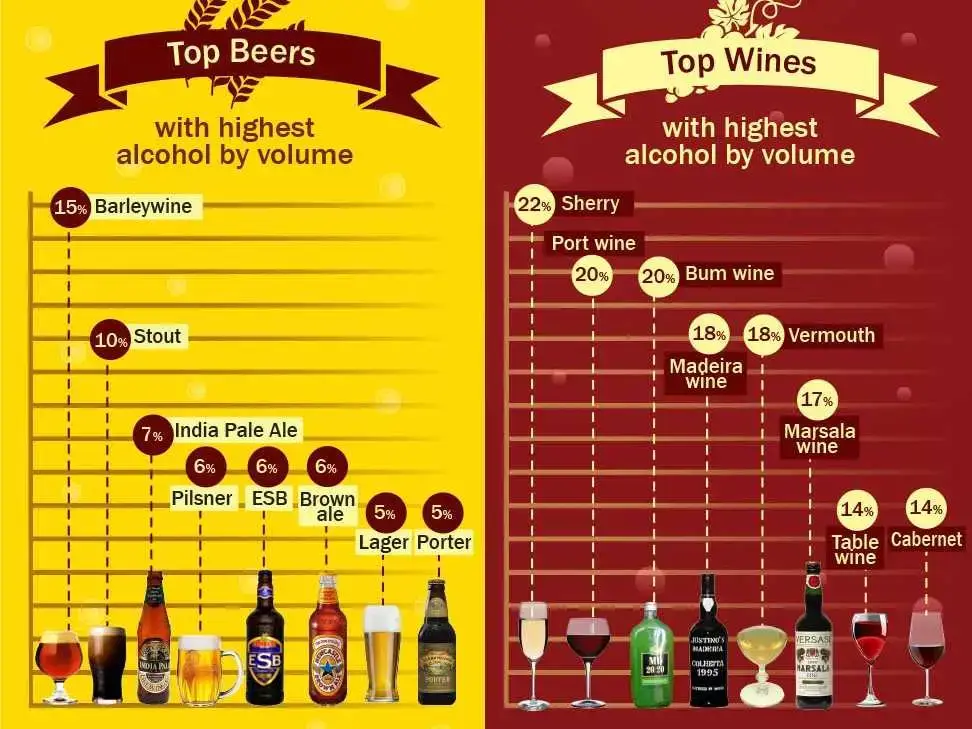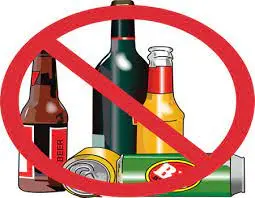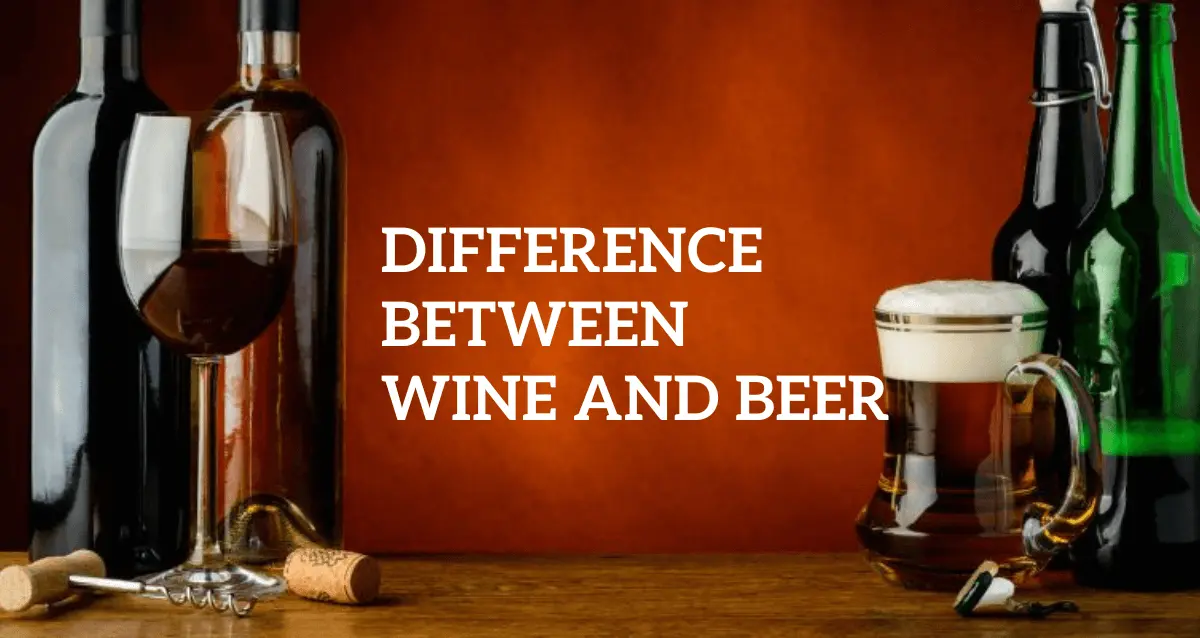One of the most notable differences between wine and beer is their alcohol content. Typically, wine has a higher alcohol percentage, from 12% to 15%, while beer usually falls between 3% and 10%. Below is a vivid comparison of both beverages which will be enough to understand the making and health-wise differences.

Alcohol Percentage: Key Difference Between Wine and Beer
The alcohol level in drinks is measured using Alcohol by Volume (ABV), which shows how much of the liquid is alcohol.
Wine, especially red wine, has an ABV between 12% and 15%. It’s made from grapes that have lots of sugar. When the grapes ferment, yeast turns the sugar into alcohol. The ABV of wine can change based on the type of grape, how it’s fermented, and how long it’s aged.
Beer has a lower ABV, around 3% to 10%. It’s made from barley, which is malted and brewed to create a sugary liquid called wort. The wort is then fermented with yeast to produce alcohol. The ABV of beer can vary widely, depending on the style of beer. For instance, light beers have an ABV as low as 3%, while stronger ales and lagers can have an ABV above 10%.
Even though wine has more alcohol per volume, a standard serving of beer is 12 ounces, while a standard serving of wine is 5 ounces. So, the actual amount of alcohol you get from a serving might be closer than you think.
Beer vs Wine Production
The production processes for beer and wine are quite different, each requiring a unique set of ingredients and techniques.
Let’s get started with the making of beer, which started with malting, where barley grains are soaked in water and allowed to germinate. Once the barley has sprouted, it’s heated to stop the germination process. This results in malted barley, which is rich in the enzymes needed to convert the grain’s starches into fermentable sugars.
Then barley is mixed with hot water to make a sweet liquid called wort. The enzymes in the barley turn starch into sugar. Then the wort is boiled and hops are added for flavor. Hops add bitterness to the beer, which balances out the sweetness of the malt.
The wort is then cooled and yeast is added. It consumes the sugars in the wort, hence producing alcohol and carbon dioxide. This process typically takes one to two weeks. The beer is then allowed to mature, a process that can take several weeks. During this time, any remaining yeast and sediment settle out of the beer.
Finally, the beer is carbonated, and then it’s packaged into bottles, cans, or kegs.
Well, the Wine Production process begins with harvesting, where the grapes are picked from the vineyard. The timing of the harvest is critical and depends on the grape variety and the desired sugar levels in the wine. After that, the grapes are crushed and pressed to extract the juice. For white wine, the skins are removed at this stage. For red wine, the skins are left in to provide color and additional flavors.
The grape juice is then fermented by adding yeast, which consumes the sugars in the juice and converts them into alcohol. This process can take anywhere from a few days to a couple of weeks. After fermentation, the wine is clarified to remove any solids. This is typically done by transferring the wine to a new container, leaving the solids behind.
The wine is then aged, either in bottles or in barrels. The aging process can last from a few months to several years, it depends on the type of wine.

Is Wine Healthier Than Beer?
The effects of wine and beer on health are complicated and differ from person to person. How much you drink and your health condition matter. Both drinks can be good for you if you don’t drink too much, but they can also have risks.
Red wine, especially, is praised because it has a type of antioxidant called resveratrol. Some studies say drinking a bit of red wine might help your heart. But other studies don’t find a connection between resveratrol and heart health.
Beer, on the other hand, has more protein, fiber, and vitamins like B vitamins, folate, and niacin. Some studies say beer might help keep your bones strong and stop you from getting too heavy.
But drinking too much beer or wine can cause big health problems like liver issues, heart trouble, and a higher risk of some cancers.
- Calories Count of Wine
Different wines have different calories, depending on how much alcohol and sugar they have. Normally, a regular glass of wine (about 5 ounces) has around 120 to 130 calories.
- Calories Count of Beer
Beers also have different calorie counts based on what type they are and how much alcohol they have. Usually, a standard can of beer (12 ounces) has about 150 calories.
Also, read how barrow differentiates from borrow.
Overconsumption Effects of Beer vs Wine
Drinking beer or wine in moderation can be good for your health, but drinking too much can cause problems. Here are some things that might happen if you drink too much:
Physical Health Issues
Drinking too much can hurt your body. It can cause liver problems like cirrhosis, where your liver gets damaged. It can also raise your blood pressure and hurt your heart, which leads to diseases like heart disease and stroke.
Putting on Weight
Beer and wine have calories, so if you drink a lot, you might gain weight. A pint of beer has about 150 calories, and a small glass of wine has around 120 to 130 calories. Drinking too much over time can make you overweight or obese.
Mental Health Problems
Drinking too much can mess with your mood and make you feel depressed, anxious, or just not yourself. Alcohol changes how your brain works, which can affect how you feel and act.
Becoming Addicted
If you drink heavily for a long time, you might become dependent on alcohol. This means you find it hard to control your drinking and it causes problems in your life, both personally and professionally.

FAQs
Wine is often fruitier and can be dry or sweet, while beer has a bitter, malty taste.
Both can cause stomach upset if consumed in excess, but beer may fill you up more due to its carbonation.
Neither is better for your liver. Both can cause liver damage if consumed in excess.
Wrapping Up
Wine and beer each have their own special qualities, from how they’re made to how they taste. If you drink them in moderation, they can be good for you. But drinking too much can cause big health problems. So, here’s to enjoy your favorite drink, but remember to do it in moderation and enjoy all the different tastes that both beer and wine have.

